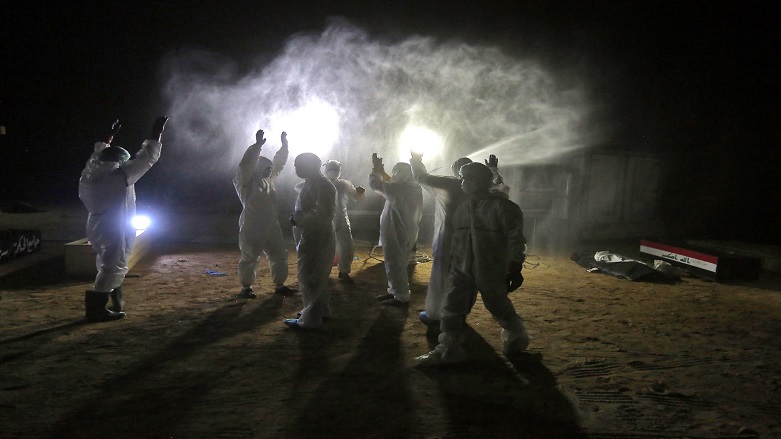COVID-19: Iraq reports decrease in cases, high recoveries

ERBIL (Kurdistan 24) – The Iraqi Ministry of Health and Environment on Monday announced 1,749 cases, a decrease in number of infections per day, with a high number of recoveries at 1,852, and 83 deaths.
A ministry statement said that of 11,127 tests conducted in the last 24 hours, 1,749 tests returned positive for the disease, raising the total number of examinations to 532,120 since the virus first entered the country.
The ministry also noted that the total number of infections in the country had reached 47,151, including 22,974 recoveries, 1,839 deaths, and 22,338 active cases.
Since late May, Iraq has been recording increasingly higher numbers of new coronavirus infections and deaths, even as authorities reintroduced partial curfews in efforts to curb the spread of the virus. Amid the crisis, health officials have repeatedly expressed fears of a collapse of the healthcare system.
The World Health Organization (WHO) in cooperation with Iraq’s Health Ministry, on Monday, launched a four-week-long awareness campaign in Baghdad’s high-risk neighborhoods aimed to increase awareness among its population against the novel coronavirus.
The campaign through mobilizing 250 volunteers delivered “critical” messages against COVID-19 to nearly six million people, WHO Iraq tweeted.
@WHOIraq alongside @MOHealth_Iraq launched a 4-week #Covid_19 awareness campaign targeting high infection areas in Baghdad. the Campaign mobilized over 250 community male/female volunteers to ensure the delivery of critical #COVID msgs to approx 6M people. https://t.co/ZGWWiIUmd4 pic.twitter.com/v49VKrFIOt
— WHO Iraq (@WHOIraq) June 29, 2020
Earlier, on Sunday, the head of Iraq’s Doctors’ Syndicate called for a complete lockdown throughout the country, warning that the rapid increase in the number of cases could result in significant loss of lives.
“Because of the surge in coronavirus infections, the scarcity of medical supplies, and the lack of oxygen, it has become vital to impose a comprehensive lockdown and quarantine,” syndicate director Abdul-Amir al-Shammari said in a statement.
Shammari stressed the necessity of “applying strict health measures for no less than three consecutive weeks to reduce the number of infections,” adding, “otherwise, we must prepare for heavy losses of life, and the possibility of a collapse in health services and the chaos that may follow.”
Editing by Karzan Sulaivany
